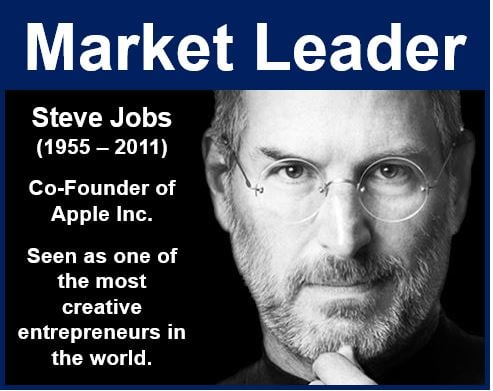The Market Leader is a company or country that has the highest sales of a specific product in the market. By ‘market,’ we refer to a country, region, or the whole world. The word ‘market’ may have a physical or abstract meaning. In this article, its meaning is mainly abstract.
The leader in the market contrasts with the market challenger. The challenger tries aggressively to expand its market and get higher up in the leadership league table.
Strategic partnerships and collaborations can also propel a company towards market leadership by combining resources and expertise for a larger market share.
A market leader by country
The United States produces 14.855 million barrels of oil per day, making it the market leader in oil.
A market leader by company
Coca-Cola Co. has 48.6% of the global carbonated beverages market, while PepsiCo Inc. has 20.5%. Therefore, Coca-Cola is the market leader, while PepsiCo is a market leader. In this context, when we use the definite article (‘the’), there is only one. When we use the indefinite article (‘a’), there is more than one.

There are several ways we can measure leadership in the market. Some league tables list companies or countries according to the total value of sales. Others calculate according to volume, i.e., the total number of units they have sold.
Market leader has a dominant position
Market leaders can use their dominant position to shape the competitive landscape and influence the direction the market takes.
Market leaders also often benefit from the ‘halo effect,’ where the perceived positive features of a single product or brand enhance the reputation of their entire portfolio.
Co-founder of IT giant Apple Inc., Steve Jobs (1955-2011), says companies aiming to become leaders in the market should:
– Own and control the relevant technology in their specialized market. Leaders do this either by the use of patents or other proprietary protections.
– Immediately adopt and implement the best technologies as soon as they become available, regardless of whether rivals and other organizations are using them.

– Be a pioneer, i.e., the first to create a category for a product or use a technology. Then, make that the industry standard.
Some analysts say that a market leader can only be classed as one when it has shown its ability to sustain its profitability through changes within the market sector and shifts in the general economy. Market sector is part of an economy that covers a wider area than an industry.
We may class a country as a market leader if it has several leading companies that focus on a market sector.
Market follower
A market follower is a company that copies what the leader does. It implements all the market leader’s successful strategies.
The market follower does not want to challenge the leader, i.e., it is happy with the current status quo. All the follower wants is to maintain its market share.
Market followers have lower advertising and R&D costs than leaders.
Ten market leaders
Here are the names of ten market leaders, their product(s), and where they are based:
Apple Inc.
Product: Smartphones (iPhone)
Based in: United States
Apple has been considered a market leader since the iPhone’s introduction in 2007.
Samsung Electronics
Product: Consumer Electronics (TVs)
Based in: South Korea
Samsung has been a leading television manufacturer since the early 2000s.
Toyota Motor Corporation
Product: Automobiles
Based in: Japan
Toyota has frequently been the world’s largest automaker since the 2000s.
Volkswagen Group
Product: Automobiles
Based in: Germany
Market Leader Since: Volkswagen has been a top seller in the global car market, competing closely with Toyota for the top spot throughout the 2010s.
Tencent
Product: Social Networking Services (WeChat)
Based in: China
Tencent’s WeChat has been dominant in the Chinese market since its release in 2011.
Alibaba Group
Product: E-commerce
Based in: China
Alibaba has been the leading e-commerce platform in China since the early 2000s.
Nestlé S.A.
Product: Food and Beverages
Based in: Switzerland
Nestlé has been a global leader in the food and beverage sector for decades, with leadership solidifying in the late 20th century.
Walmart Inc.
Product: Retail
Based in: United States
Walmart has been the world’s largest retailer since the late 1990s.
Royal Dutch Shell
Product: Oil and Gas
Based in: Netherlands/United Kingdom
Shell has been one of the leaders in the oil and gas industry for several decades, with its current form from a merger in 1907.
GlaxoSmithKline (GSK)
Product: Pharmaceuticals
Based in: United Kingdom
GSK has been a leading pharmaceutical company since its formation in 2000 by the merger of Glaxo Wellcome and SmithKline Beecham.
Video explanation
